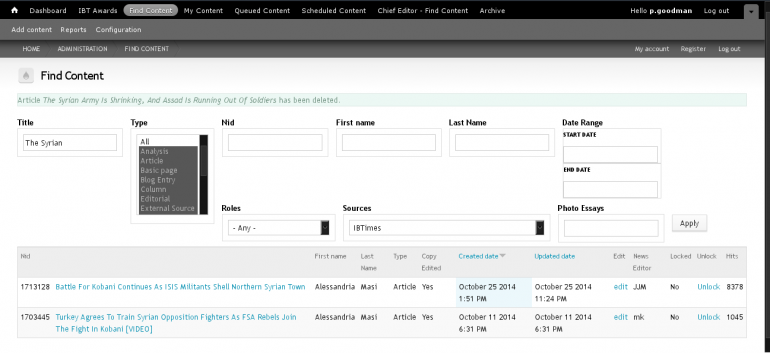
On Wednesday, hackers claiming to be affiliated with the Syrian Electronic Army may have penetrated the website of the International Business Times, an online business-news publication.
“It does indeed appear that we have been hacked by the Syrian Electronic Army,” said IB Times editor-in-chief Peter Goodman in an email. “Our IT people are evaluating. We are taking appropriate security measures.”
The hackers, who support the regime of Syrian president Bashar Assad, appear to have deleted a story about Syria’s shrinking army. While it still appears in Google News, the link to the article returns a 404 “page not found” error on the IB Times website.

If the goal was to suppress the article, the hackers weren’t completely successful: A version of the article was published with a new URL.
The International Business Times is owned by New York-based IBT Media, which also publishes Newsweek.

Another article with the headline “Hacked by the Syrian Electronic Army” now appears on the website. The article contains a screenshot which appears to be the site’s content-management system. Goodman’s username appears in the screenshot, along with a notification which indicates the article about Syria’s army was successfully deleted.
In the article, hackers threatened to delete the entire IB Times website.
The IB Times Twitter account acknowledged the incident in a tweet:
Syrian Electronic Army is claiming responsibility for a hack of our website. Updates to follow. http://t.co/b3Wf58sDux
— Intl. Business Times (@IBTimes) December 17, 2014
Spear-Phishing The Media
In an email to staff earlier Wednesday, IB Times managing editor Mark Bonner warned staff not to open any emails that appeared to come from IBT Media cofounder and chief content officer Johnathan Davis. Those emails included a link to a suspicious website, according to a source familiar with the incident.
Goodman said it was “unclear at this point, but possible” that his account had been penetrated. An attack like this targeting high-level individuals to obtain their login credentials is known as “spear phishing.”
Later on Wednesday, Bonner told staffers that the IB Times content-management system was down and that writers should submit articles to editors via Google Docs. A source confirmed that the screenshot of the IB Times content-management system posted in the “Hacked” article appeared to be authentic.
The IB Times hack comes on the heels of the large-scale hack of Sony Pictures, apparently conducted by hackers who objected to the studio’s release of The Interview, a movie about the assassination of North Korean leader Kim Jong-Un. Sony has cancelled the movie’s release amid threats of terrorist attacks on theaters which screen it.
In 2009, Gawker Media, the publisher of Gizmodo, Jezebel, and other websites, experienced a distributed denial-of-service attack aimed at rendering its sites inaccessible. And for four months beginning in late 2012, hackers in China attacked the computer systems of the New York Times, attempting to gain access to email and files.
Together, these incidents suggest we’re entering an ugly world where people who object to a movie or a news article on political grounds won’t just leave nasty comments or tweet harsh criticisms. They’ll seek to eliminate their targets’ ability to publish.
Photo by Shutterstock; screenshots via IB Times

















